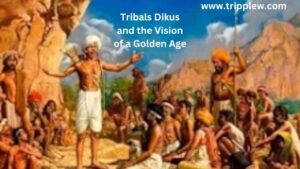
Tribals Dikus and the Vision of a Golden Age :
Class 8 History
In this article we are providing questions and answers of chapter 4 Tribals Dikus and the Vision of a Golden Age : Class 8 History
1. Fill in the blanks:
a) The British described the tribal people as ____________.
b) The method of sowing seeds in jhum cultivation is known as ____________.
c) The tribal chiefs got ____________ titles in central India under the British land settlements.
d) Tribals went to work in the ____________ of Assam and the ____________ in Bihar.
Answers:
a) wild and savage
b) broadcasting
c) land
d) tea plantations; coal mines
2. State whether true or false:
a) Jhum cultivators plough the land and sow seeds.
b) Cocoons were bought from the Santhals and sold by the traders at five times the purchase price.
c) Birsa urged his followers to purify themselves, give up drinking liquor, and stop believing in witchcraft and sorcery.
d) The British wanted to preserve the tribal way of life.
Answers:
a) False
b) True
c) True
d) False
3. What problems did shifting cultivators face under British rule?
Answer:
Shifting cultivators faced several challenges under British rule:
- The British wanted to bring settled agriculture to increase revenue and considered shifting cultivation as primitive.
- Forest laws restricted access to forested areas, making it difficult for shifting cultivators to find land for cultivation.
- Many were forced to change their occupations or migrate in search of work.
4. How did the powers of tribal chiefs change under colonial rule?
Answer:
Under colonial rule, the powers of tribal chiefs were significantly reduced:
- They lost their administrative and judicial powers.
- They were required to follow laws made by British officials.
- Their roles became more focused on collecting taxes and rent for the British.
5. What accounts for the anger of the tribals against the dikus?
Answer:
The tribals were angry with the dikus (outsiders) because:
- Moneylenders and traders exploited them economically.
- The British imposed restrictive forest laws, limiting their traditional practices.
- Missionaries and landlords interfered with their cultural and religious practices.
6. What was Birsa’s vision of a golden age? Why do you think such a vision appealed to the people of the region?
Answer:
Birsa Munda envisioned a golden age where:
- Tribals lived free from the oppression of dikus.
- They could practice their traditional customs and beliefs without interference.
- There was no exploitation, and they had control over their land and resources.
This vision appealed to the people because it promised a return to autonomy, dignity, and the restoration of their traditional way of life, free from external domination and exploitation.